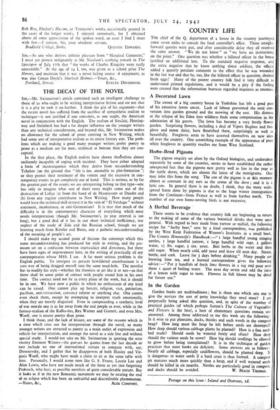COUNTRY LIFE-
THE chief of the Q. department of a house in the country journeyed some seven miles to consult The food controller's office. Three straight- forward queries were put, and after considerable delay they all received the same answer. " We do not know " or " we have no instructions on the point." One question was whether a billeted officer in the house justified an additional hen. To the standard negative response, and the extra negative that he knew nothing about soldiers, the official added a queerly petulant comment to the effect that he was wounded in the last war and that he, too, like the billeted officer in question, desired fresh eggs! Many of the poorer country folk find it very difficult to understand printed regulations, and it would be a pity if the feeling were created that the information bureaux regarded inquirers as enemies.
A Decorated Lawn The owner of a big country house in Yorkshire has left a good part of his extensive lawns uncut. Lack of labour prevented the total con- version into garden ground and the mowing of the rest. His distress at the relapse of his Eden into wildness finds some compensation in the admiration of his guests. The lawn has become a very lovely flower garden. Surprising flowers, including a deal of Vipers Bugloss and fox- glove and moon daisy, have flourished there, surprisingly as well as beautifully. Foxgloves seem to have asserted themselves on new sites all over the country. One astonishing example of the appearance of pure white foxgloves in quantity reaches me from West Scotland.
Home-Bred Pigeons
The pigeon enquiry set afoot by the Oxford biologists, and undertaken separately by some of the counties, seems to have established the rather unexpected fact that the pigeons nest pretty well as late in the year as the turtle doves, which are almost the latest of the immigrants. One may infer this from the song. The coo of the pigeon is at this moment almost as constant in my ears as the croon of the dove ; and it is a lyric coo. In general there is no doubt, I think, that the more wide- spread harm done by pigeons is due to the huge winter immigrations from the Continent—from France as well as from further north. The number of our own home-nesting birds is not excessive.
A Herbal Beverage There seems to be evidence that country folk are beginning to return to the making of some of the various botanical drinks that were once general. With regard to beer made from yarrow or milfoil, the following recipe for "herby beer," sent by a kind correspondent, was published by the West Kent Federation of Women's Institutes in a small book, The County Housewife's Handbook:—"I large handful young stinging nettles, r large handful yarrow, r large handful wild sage, 2 gallons water, if lbs. sugar, 2 ozs. yeast. Boil herbs in the water and then add sugar. When nearly cold, add yeast and leave till next day. Strain, bottle, and cork. Leave for 3 days before drinking." Many people are brewing lime tea, and a learned correspondent gives the following advice: —" Put 2 handfuls of fresh lime flowers in a jug and pour over them x quart of boiling water. The next day strain and add the juice of a lemon with sugar to taste. Flowers in full bloom may be dried for future use."
In the Garden Garden books are multitudinous ; but is there one which sets out to give the novices the sort of petty knowledge they need most? I am perpetually being asked this question, and, in spite of the number of practical guides (of which perhaps Sutton's The Culture of Vegetables and Flowers is the best), a host of elementary questions remain un- answered. Among those addressed to me this week are the following: Is it wise to put plantains, docks, thistles and such weeds in the compost heap? How long must the heap be left before seeds are destroyed? How deep should various cabbage plants be planted? How is a fine seed- bed made? Should seeds be watered freely and often? How deep should the various seeds be sown? How big should seedlings be allowed to grow before being transplanted? It is in the technique of garden practices that most books are deficient. Some answers are as follows: Nearly all cabbage, especially cauliflowers, should be planted deep. It is dangerous to water seeds if a hard crust is thus formed. A compost pit matures much more quickly than a heap, and if well watered seeds should be killed in six months. Nettles are particularly good in compost,
Postage on this issue : Inland and Overseas, rd.


























 Previous page
Previous page